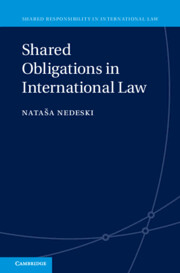It is widely acknowledged that individual moral obligations and responsibility entail shared (or joint) moral obligations and responsibility. However, whether individual epistemic obligations and responsibility entail shared epistemic obligations and responsibility is rarely discussed. Instead, most discussions of doxastic responsibility focus on individuals considered in isolation. In contrast to this standard approach, I maintain that focusing exclusively on individuals in isolation leads to a profoundly incomplete picture of what we're epistemically obligated to do and when we deserve epistemic blame. First, I argue that we have epistemic obligations to perform actions of the sort that can be performed in conjunction with other people, and that consequently, we are often jointly blameworthy when we violate shared epistemic obligations. Second, I argue that shared responsibility is especially important to doxastic responsibility thanks to the fact that we don't have the same kind of direct control over our beliefs that we have over our actions. In particular, I argue that there are many cases in which a particular individual who holds some problematic belief only deserves epistemic blame in virtue of belonging to a group all the members of which are jointly blameworthy for violating some shared epistemic obligation.


